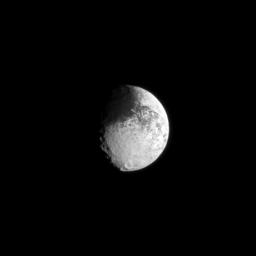
|
Yin Yang Iapetus
- Click the image above for a larger view
- Full-Res JPEG (460 x 460) (6.0 kB)
- Full-Res TIFF (460 x 460) (212.1 kB)
Caption:
The two-toned surface of Saturn's moon Iapetus is demonstrated in the dark region of the moon visible on the top left and the bright crater in the lower right of this Cassini portrait.
See PIA11690 to learn more about the brightness dichotomy on Iapetus.
The moon's oblate shape is also visible here. This view looks toward the Saturn-facing side of Iapetus (1,471 kilometers, or 914 miles across). North on Iapetus is up and rotated 35 degrees to the right.
The image was taken in visible light with the Cassini spacecraft narrow-angle camera on Feb. 23, 2010. The view was obtained at a distance of approximately 1.6 million kilometers (994,000 miles) from Iapetus and at a Sun-Iapetus-spacecraft, or phase, angle of 51 degrees. Image scale is 9 kilometers (6 miles) per pixel.
Background Info:
The Cassini-Huygens mission is a cooperative project of NASA, the European Space Agency and the Italian Space Agency. The Jet Propulsion Laboratory, a division of the California Institute of Technology in Pasadena, manages the mission for NASA's Science Mission Directorate, Washington, D.C. The Cassini orbiter and its two onboard cameras were designed, developed and assembled at JPL. The imaging operations center is based at the Space Science Institute in Boulder, Colo.
For more information about the Cassini-Huygens mission visit http://saturn.jpl.nasa.gov . The Cassini imaging team homepage is at http://ciclops.org .
Cataloging Keywords:
| Name | Value | Additional Values |
|---|---|---|
| Target | Iapetus | Saturn |
| System | Saturn | |
| Target Type | Satellite | Planet |
| Mission | Cassini-Huygens | |
| Instrument Host | Cassini Orbiter | |
| Host Type | Orbiter | |
| Instrument | Imaging Science Subsystem (ISS) | |
| Detector | Narrow Angle Camera | |
| Extra Keywords | Crater, Grayscale, Rotation, Visual | |
| Acquisition Date | ||
| Release Date | 2010-04-05 | |
| Date in Caption | 2010-02-23 | |
| Image Credit | NASA/JPL/Space Science Institute | |
| Source | photojournal.jpl.nasa.gov/catalog/PIA12604 | |
| Identifier | PIA12604 | |
